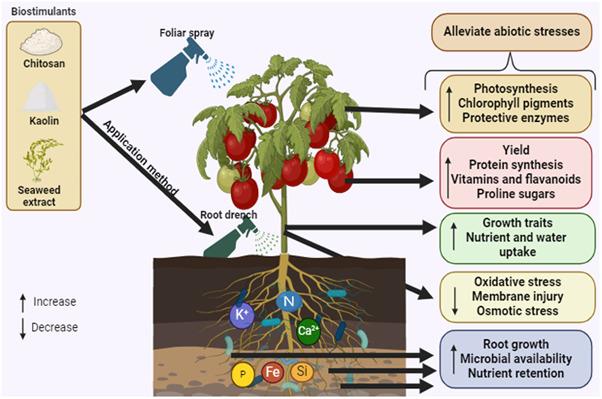Boosting Farmers' Yield Gains In The Face Of Changing Environmental Dynamics
The emergence of climate change has had a significant negative influence on global agricultural productivity. Climate change causes drought, salinity, waterlogging, temperature stress (including heat stress, freezing, and chilling), and heavy metal accumulation, which makes crops more vulnerable to other pressures, such as pests and diseases.
The process of global climate change is ongoing, although it has accelerated significantly over the past century. Exacerbating the problem is the rapid surge in global temperature, resulting in reduced glaciers, increased typhoons and hurricanes, and other extreme events, which consequently cause decline in farm output. As climate change bites harder, several abiotic stresses are expected to escalate. The economic implications have resulted in about $125bn. To meet the rising food demand of an estimated 9 to 10 billion people by 2050 and strengthen global food security, scientists worldwide have developed diverse strategies to enhance crop performance and resilience under abiotic stress conditions.
A recent high-impact and editorial choice article titled“Recent Advancements in Mitigating Abiotic Stress in Crops,” led by Oyebamiji Yusuf Opeyemi, a PhD researcher at the University of Vermont, offers a comprehensive roadmap for alleviating climate change impact encountered during crop production. Oyebamiji Yusuf Opeyemi is an expert in plant science and climate change research, with several publications and years of experience enhancing crop performance under severe environmental stress scenarios. Oyebamiji's research has focused on improving food security globally, utilising both conventional and molecular breeding technologies. His published work unravels and explores a wide range of breeding techniques (conventional and modern), agronomic practices, seed priming and microbial seed treatment, microorganism inoculation, and grafting, as well as the use of plant growth regulators and osmoprotectants. As Oyebamiji noted, the progressive escalation of climate change scenarios has emerged as a significant global concern and threat to global food security. Therefore, it is crucial to develop effective strategies to mitigate the adverse effects of these challenges on the agricultural industry and enhance crop resilience and yield.
Diverse strategies discussed by Oyebamiji and his team include the development of cultivars that are resistant to climate change through the application of both conventional and modern breeding techniques. Additionally, the integration of prospective and emerging technologies, such as speed breeding, with the existing technique will not only enhance crop productivity under abiotic stress but also accelerate the development of new tolerant crops, consequently boosting agricultural production, says Oyebamiji.
Biostimulants: A Novel Strategy to Alleviate Abiotic Stresses
Plant biostimulants are also referred to as agricultural biostimulants. A major scientific advance toward ensuring a sustainable future food supply is the use of biostimulants, which have been identified as a potentially innovative way to promote plant growth and crop yield under both stress and non-stress conditions. The plant biostimulants used in agricultural production include biochar, yeast extract, seaweed extract, and the application of agri-nanotechnology. In the current scenario of massive environmental degradation, this technology not only enhances promising solutions in plant production and tolerance during adverse environmental scenarios but cost-effective and eco-friendly, says Oyebamiji. Furthermore, he noted that these substances work by regulating hormonal pathways, improving antioxidant defence mechanisms, and suppressing reactive oxygen species, consequently enhancing plant productivity. His article also emphasises that the crosstalk (combined application) between these techniques is an important strategy to enhance productivity under harsh environmental conditions.
Global Importance and Action
The study's impact extends to farmers across Africa, Asia, and Latin America, who face comparable agricultural challenges. In addressing these vulnerabilities, Oyebamiji's research contributes to global food security efforts and directly supports the United Nations' Sustainable Development Goals (SDGs), specifically Goals 2: Zero Hunger and 13: Climate Action. The study's conclusions provide scientific and policy-driven recommendations that could revolutionise crop cultivation and protection in the twenty-first century, as the world prepares for an impending food crisis. Adopting these technologies can help mitigate the negative effects of climate change on agriculture globally, ensuring a steady food supply for the growing population. Oyebamiji stated,“Our study attempts to offer a workable solution to the urgent problems caused by climate change. We can ensure a sustainable future for agriculture globally by improving crop resilience.” Moving forward, policymakers, agricultural stakeholders, and global food organisations must acknowledge the urgency of adopting these innovative approaches. Promoting interdisciplinary exchange through international collaboration, conferences, publications, and data sharing is essential. Such efforts enable researchers to integrate expertise across multiple fields, fostering deeper insights and more holistic solutions, an approach emphasised in Oyebamiji's publication.

Legal Disclaimer:
MENAFN provides the
information “as is” without warranty of any kind. We do not accept
any responsibility or liability for the accuracy, content, images,
videos, licenses, completeness, legality, or reliability of the information
contained in this article. If you have any complaints or copyright
issues related to this article, kindly contact the provider above.
Most popular stories
Market Research

- Nutraceuticals Market Size Projected To Witness Strong Growth During 2025-2033
- Excellion Finance Scales Market-Neutral Defi Strategies With Fordefi's MPC Wallet
- Pluscapital Advisor Empowers Traders To Master Global Markets Around The Clock
- Meme Coin Little Pepe Raises Above $24M In Presale With Over 39,000 Holders
- Vietnam Vegan Food Market Size, Share, Trends And Report 2025-2033
- Red Lions Capital And Neovision Launch DIP.Market Following ADGM Regulatory Notification






















Comments
No comment